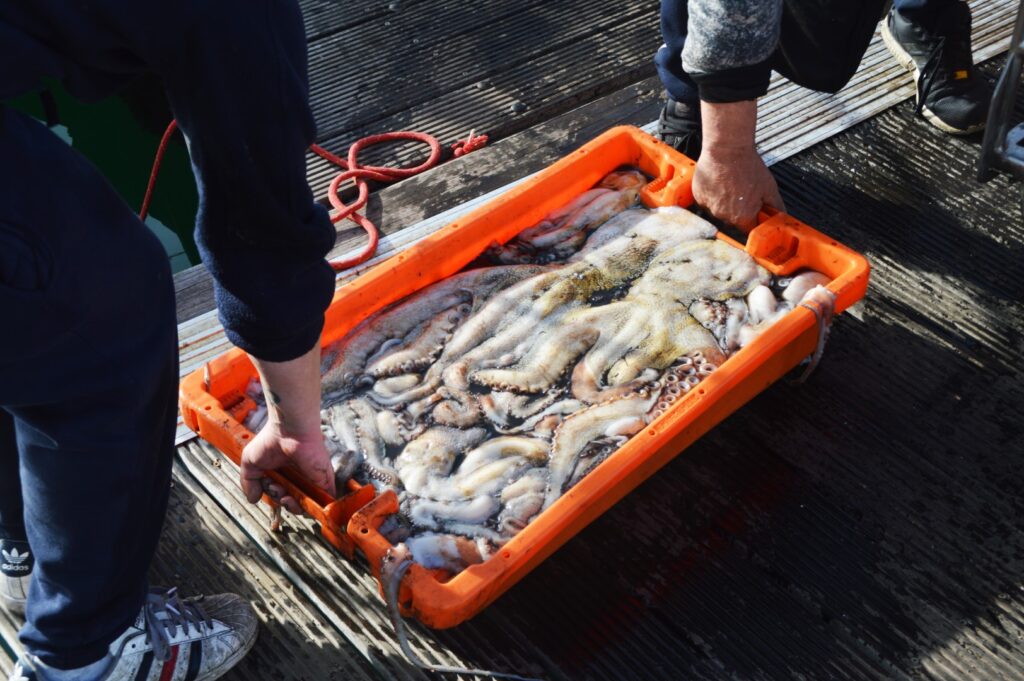The ordinance that creates the Comanagement Committee for octopus fishing (Octopus vulgaris) in the Algarve was published this Wednesday, March 6, in Diário da República. This will be the second co-management committee for a fishery in Portugal, after the pioneering work of the Percebe Harvest Co-Management in the Berlengas Natural Reserve.
In October 2023, the request for the creation of this co-management committee formally began with the Government, after more than 51% of license holders for octopus fishing in the Algarve were in favor of the co-management model for the region.
In February 2024, with the continued collection of signatures, the Directorate-General for Natural Resources, Security and Maritime Services (DGRM) verified that the implementation of this co-management model already gathered the support of over 75% of license holders (representing more than 600 licenses), meeting the necessary conditions to continue the process of establishing the Octopus Fishing Co-management Committee in the Algarve.
This advance results from the ParticipiPESCA project, whose main objective was to implement co-management for octopus fishing in the Algarve, aiming at the sustainability of this resource.
For two years, the project involved 15 fishermen's associations and producer organizations, representing more than 700 fishermen throughout the Algarve region, in addition to other entities involved in fishing, such as the administration, scientific community, non-governmental organizations and civil society.
After the formal completion of the project, in June 2023, two more fishermen's associations joined, totaling 17.
The ParticiPESCA project was led by ANP|WWF in partnership with IPMA, CCMAR and EDF, financed by the MAR 2020 Operational Program and co-financed by the Oceano Azul Foundation, whose support was also crucial to ensure the entire signature collection process.
«Co-management consists of a shared management regime for a fishery or fishing area, constituting a new paradigm in the management of fishing resources that is based on an inclusive, transparent, informed, accessible and science-based participatory process, in which everyone has a voice and decision about the future of the activity», explains ANP|WWF.
Its operationalization is carried out through the creation of a Co-management Committee, «with regulatory competence to sustainably manage and monitor the fishery or respective area, in accordance with the best scientific knowledge available», adds the Non-Governmental Environmental Organization .
In this context, «the implementation of co-management of octopus fishing in the Algarve places Portugal at the forefront of participatory and sustainable fisheries management at European level», says ANP|WWF.
«This is a unique step towards the sustainability of fishing and safeguarding coastal communities in the region. It is truly impressive to confirm that this was a desire declared by a large majority of fishermen, whose participation, combined with scientific knowledge, will undoubtedly contribute to more effective and sustainable management of fisheries", explains Rita Sá, coordinator of Oceans and Fisheries at ANP |WWF.
«With the creation of the co-management committee, and as an alternative to the traditional «top-down» approach, we will all be working hand in hand in building the processes for regulating, monitoring and inspecting octopus fishing in the Algarve. As we have mentioned, the future of octopus fishing in the Algarve passes through here», he also argues.
According to the recommendations of the ParticiPESCA project delivered to the Government, the Co-management Committee for Octopus Fishing in the Algarve, supported by a General Assembly that takes the decisions and an Executive Committee that develops the proposals, should be made up of fishermen's associations and fishing organizations. producers in this intervention area, by entities with competences in marine administration, municipalities, scientific organizations and environmental organizations.



















Comments